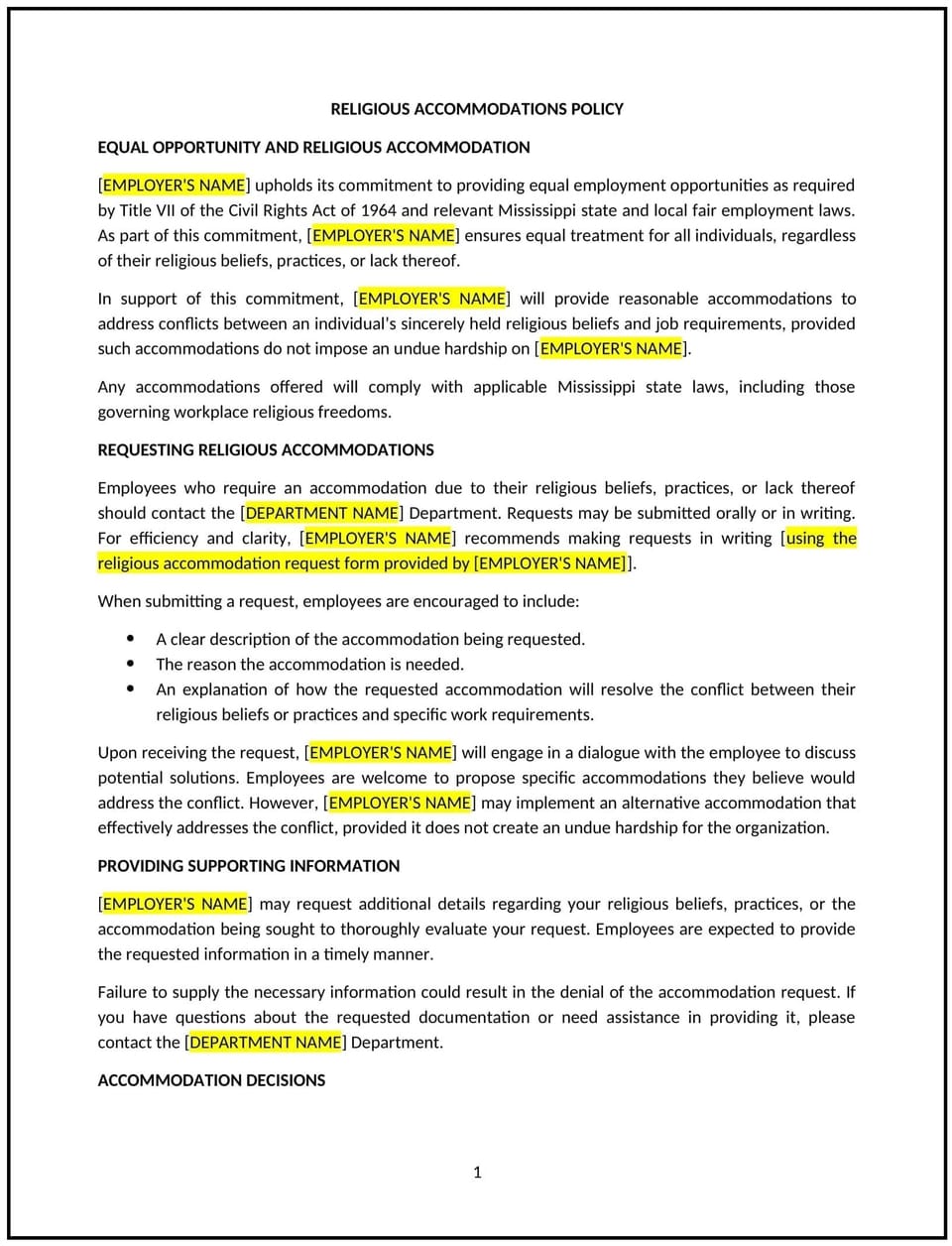Religious accommodations policy (Mississippi): Free template

Religious accommodations policy (Mississippi)
A religious accommodations policy helps Mississippi businesses establish clear guidelines for addressing employee requests related to religious beliefs and practices. This policy supports a respectful and inclusive workplace by outlining procedures for handling accommodations such as schedule adjustments, dress code modifications, and time off for religious observances.
By implementing this policy, businesses can create an inclusive work environment that respects religious diversity while balancing operational needs.
How to use this religious accommodations policy (Mississippi)
- Define religious accommodations: Specify what types of accommodations may be requested, including schedule changes, prayer breaks, attire modifications, and religious holidays.
- Establish a request process: Outline how employees should submit accommodation requests, including required forms and advance notice expectations.
- Assign a point of contact: Designate a manager or HR representative to handle requests and evaluate feasibility.
- Assess requests on a case-by-case basis: Review each request based on business operations, job duties, and the reasonableness of the accommodation.
- Maintain open communication: Encourage employees and managers to discuss requests to find practical solutions.
- Document decisions and actions: Keep records of accommodation requests and any adjustments made.
- Provide training: Educate managers on handling religious accommodation requests fairly and professionally.
- Review and update the policy regularly: Ensure the policy aligns with evolving workplace needs and best practices.
Benefits of using this religious accommodations policy (Mississippi)
This policy offers several benefits for Mississippi businesses:
- Supports workplace inclusivity: Promotes a respectful and diverse work environment.
- Reduces conflicts: Provides a structured process for addressing accommodation requests.
- Enhances employee morale: Demonstrates a commitment to respecting religious beliefs.
- Improves business reputation: Establishes the company as a supportive and inclusive employer.
- Streamlines accommodation processes: Creates clear guidelines for handling religious accommodations efficiently.
Tips for using this religious accommodations policy (Mississippi)
- Encourage early requests: Employees should submit accommodation requests in advance whenever possible.
- Maintain consistency: Businesses should evaluate requests fairly and consistently to avoid favoritism or discrimination.
- Keep records of requests: Document all accommodation requests and responses for future reference.
- Provide alternative solutions: If a requested accommodation is not feasible, businesses should explore other reasonable options.
- Train managers: Educate supervisors on how to handle religious accommodations professionally and respectfully.
Q: Why should Mississippi businesses implement a religious accommodations policy?
A: A structured policy helps businesses fairly handle employee requests related to religious beliefs while maintaining workplace productivity.
Q: What types of religious accommodations can employees request?
A: Employees may request schedule changes, time off for religious observances, prayer breaks, or modifications to dress codes.
Q: How should businesses evaluate religious accommodation requests?
A: Businesses should assess requests based on operational feasibility, job requirements, and potential impact on other employees.
Q: Can businesses deny religious accommodation requests?
A: Businesses may deny requests if they cause undue hardship, significantly disrupt operations, or pose safety concerns.
Q: How should businesses document accommodation requests?
A: Managers should maintain records of requests, discussions, and final decisions to ensure transparency and consistency.
Q: What steps should businesses take if an accommodation creates a conflict?
A: Businesses should engage in open discussions with employees and explore alternative solutions that balance religious needs with workplace operations.
Q: How often should this policy be reviewed?
A: Businesses should review the policy annually to ensure it aligns with workplace needs and best practices.
This article contains general legal information and does not contain legal advice. Cobrief is not a law firm or a substitute for an attorney or law firm. The law is complex and changes often. For legal advice, please ask a lawyer.


